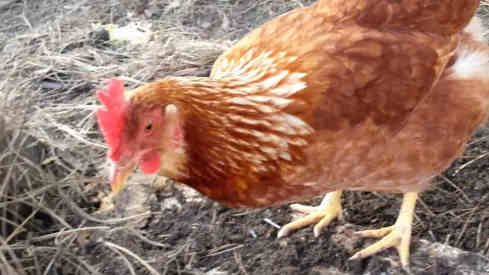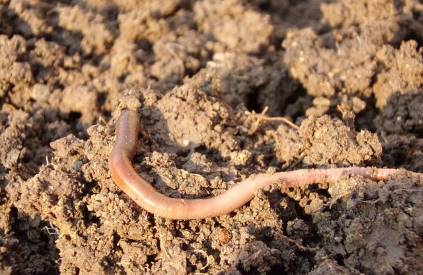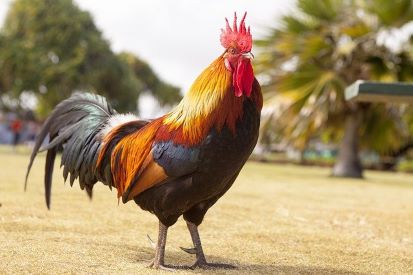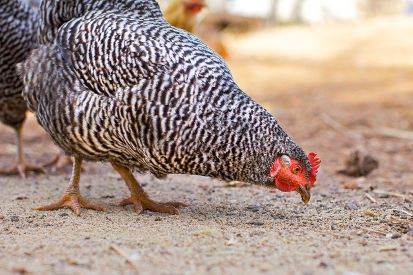Can chickens eat worms? The answer is yes! Chickens love to eat worms, which are a great source of protein. Chickens will often eat more worms than they need to, so it’s important to offer them a variety of other foods.
Worms provide chickens with several essential nutrients, including protein, fat, vitamins, and minerals. They are also a good source of fiber, which helps keep the chicken’s digestive system healthy.
This article will discuss what kind of worms chickens can eat, how many they should eat, and what to do if you find your chicken eating too many worms.

Can chickens eat worms?
Worms are not only a good source of protein for chickens, but they also provide essential nutrients and minerals that chickens need to stay healthy. Chickens need a balanced diet like any other animal, and worms can help provide them with the nutrients they need.
However, it’s important to remember that chickens should not eat too many worms since they can become sick from overeating them.
There are two main types of worms that chickens can eat: earthworms and mealworms. Earthworms are the type of worm you find in soil and are generally bigger than mealworms. Mealworms are the larvae of beetles, and they are smaller than earthworms. Both types of worms are a good source of nutrition for chickens.
[ChickenAffiliate]
The benefits of eating worms for chickens
If you’re a chicken owner in the United States, you may have never considered feeding worms to your flock. However, there are many benefits to doing so. Here are five reasons you should start incorporating worms into your chickens’ diet.
Chickens who eat worms are more resistant to disease
One of the main benefits of chickens eating worms is that they become more resistant to disease. This is because worms contain a high amount of protein, valuable antioxidants, and other nutrients that strengthen the chickens’ immune systems.
Chickens who consume worms regularly are less likely to get sick and are better able to fight off disease when exposed to it.
Great source of protein
Another benefit of feeding your chicken worms is that it is an excellent source of protein. Protein is essential for the growth and development of all animals, including chickens. It’s impressive that 100 grams of earthworms contain about 28 grams of protein. So if you’re looking for a way to boost your chickens’ protein intake, feeding them worms is one way to do it.
By eating worms, your chicken will get a high-quality source of protein that will help them grow and stay healthy.
Helps keep digestive systems healthy
Earthworms help keep a chicken’s digestive system healthy. They consume bacteria and other harmful microorganisms that can cause disease. In turn, these earthworms help improve the chicken’s overall health by reducing the risk of diseases and infections.
In addition, the act of eating worms also helps keep a chicken’s beak and gums healthy, as well as reduces tartar buildup on their teeth.
Helps reduce ammonia levels
Earthworms also help reduce ammonia levels in chicken coops. Ammonia is a byproduct of decomposing manure and can harm chickens and humans if it gets too concentrated.
By eating earthworms, chickens are effectively helping to clean up their coops and make them safer for everyone involved.
Natural dewormer
Chickens can sometimes pick up parasites like roundworms and tapeworms from the soil, making them very sick if left untreated. However, feeding your chickens earthworms regularly can help prevent them from becoming infected with these parasites in the first place.
If your chickens get parasites, feeding them earthworms will help them get rid of them naturally.
Things to watch out for when feeding worms to chickens

For chicken owners, feeding worms to chickens can be a great way to add some extra nutrients to their diet. However, there are a few things to watch out for when doing so. In this section, we will discuss three of those things.
Make sure the worms are free of pesticides and other harmful chemicals
The last thing you want is to feed your chickens worms that have been exposed to pesticides or other harmful chemicals. This could make your chickens sick or even kill them.
There are a few ways to ensure that the worms you’re feeding your chickens are free of these things. One way is to buy them from a reputable source, such as a local farmer or an online retailer that specializes in selling worms for chickens. Another way is to raise the worms yourself using organic methods.
Avoid feeding your chickens too many worms at once
Just like with any other food, it’s possible to overfeed your chickens with worms. This can lead to health problems, such as indigestion or diarrhea.
To avoid this, start by giving your chickens only a small handful of worms per day and gradually increase the amount as they get used to it.
Be aware of the risk of parasites when feeding worms to chickens
One final thing to remember is that some types of worms can carry parasites that can infect your chickens. To avoid this, it’s important only to feed your chickens worms that have been properly cooked or heat-treated before being fed to them.
How often should chickens eat worms?
While there is no definitive answer, most experts recommend that chickens eat worms a few times a week. This ensures they get the nutrients they need without overindulging in this tasty treat.
In addition, it is important to ensure that the worms are fresh and healthy. Spoiled or rotten worms can make chickens sick, so it is best to be safe. By following these guidelines, you can ensure that your chickens stay healthy and happy.
Read More: Do Chickens Eat Ants? 5 Awesome Benefits
How to prepare worms for feeding to chickens

Raising chickens can be a fun and rewarding experience. Part of caring for your chickens includes ensuring they are getting the proper nutrition. One way to do this is by feeding them worms. Here is a step-by-step guide on preparing worms for feeding your chickens.
- Collect the worms. You can do this by going outside after it rains and looking for worms in the ground. Alternatively, you can purchase worms from a bait shop or online.
- Rinse the worms off with water. This will remove any dirt or debris that might be on them.
- Chop the worms into small pieces. This will make them easier for your chickens to eat and digest.
- Serve the worms to your chickens and enjoy watching them eat!
Following the steps outlined above, you’ll have your chickens eating worms in no time.
Can baby chicks eat worms?
Regarding baby chicks, it is important to be mindful of what they are eating. While young chicks can benefit from the protein found in worms, they should not be allowed to eat them unsupervised.
Adult chickens have a strong crop that helps them to digest tough food items, but baby chicks lack this essential organ. As a result, feeding them worms can lead to crop impaction, which can be fatal.
If you choose to feed your baby chicks worms, do so in moderation and always supervise their consumption.
Read More: Do Chickens Eat Slugs? Yes, With Some Risks
What other insects can chickens eat?

Most everyone knows that chickens love to eat worms. But did you know that there are plenty of other insects that chickens enjoy eating just as much, if not more? Now we’ll explore some of the other insect options out there for chicken owners.
Grasshoppers
Grasshoppers are a great source of protein for chickens. If you have free-range chickens, they will likely find grasshoppers on their own. If your chickens are confined to a coop, you can purchase grasshoppers online or at your local bait and tackle shop.
Just be sure to remove the wings and legs before feeding them to your chickens to avoid injury.
Crickets
Crickets are another good source of protein for chickens. Like grasshoppers, crickets can be found in the wild or purchased online or at your local bait and tackle shop. Again, remove the wings and legs before feeding them to your birds.
Beetles
Chickens can eat many different beetles, including June beetles, Japanese beetles, and black soldier fly larvae. If you have an infestation of these beetles, you can gather them up and feed them to your chickens.
You can also purchase beetle larvae online or at some pet stores.
Read More: Do Chickens Eat Japanese Beetles? 5 Amazing Benefits
How to give chickens a healthy and balanced diet
Of course, like all pets, chickens need proper care and nutrition to stay healthy and happy. Here we’ll give you an overview of what your chickens need to eat to stay healthy and thrive. Keep reading to learn more.
A healthy diet for chickens
Chickens are omnivores, which means that they eat both plants and animals. In the wild, chickens would forage for food all day long, eating whatever they could find. However, most pet chickens live in coops or runs and don’t have access to that variety.
As a chicken owner, it’s your responsibility to ensure that your chickens get all the nutrients they need to stay healthy. A typical chicken diet consists of three main components:
Grit
Grit is sand that helps chickens digest their food properly. If you have backyard chickens, they can get grit from scratching around in the dirt. If you keep your chickens in a coop or run, you’ll need to give them access to grit (you can usually find it at your local feed store).
Scratch
Scratch is a mix of grain (usually corn) and sunflower seeds that provide chickens with essential carbohydrates and fats. You can usually find scratch at your local feed store as well.
Greens
Greens are an important source of vitamins and minerals for chickens. Common greens include lettuce, kale, collards, and spinach. If you have backyard chickens, they can help themselves to greens growing in your garden (make sure they don’t have access to any poisonous plants).
If you keep your chickens in a coop or run, you’ll need to provide them with fresh greens daily.
Water
Chickens also need access to water at all times. A water dispenser is an easy way to ensure your chickens always have fresh water.
Can chickens eat worms – final thoughts
Chickens can benefit from eating worms, but it’s important to ensure they don’t eat too many. A balanced diet is essential for chickens to stay healthy, so offer them a variety of other foods in addition to worms.
Earthworms and mealworms are both good options for chicken food, and they will provide your chicken with the protein and nutrients they need.
Related Articles:
